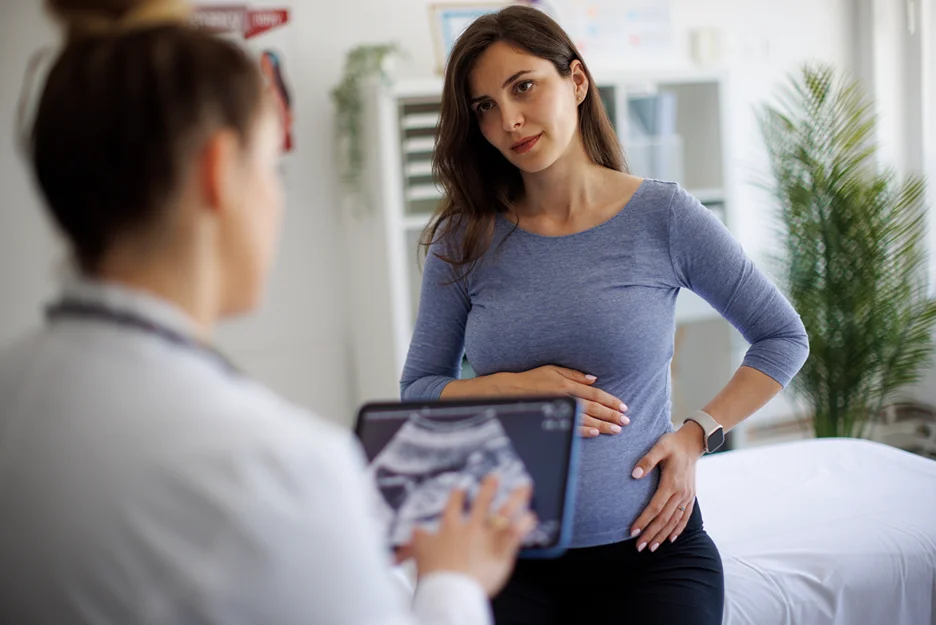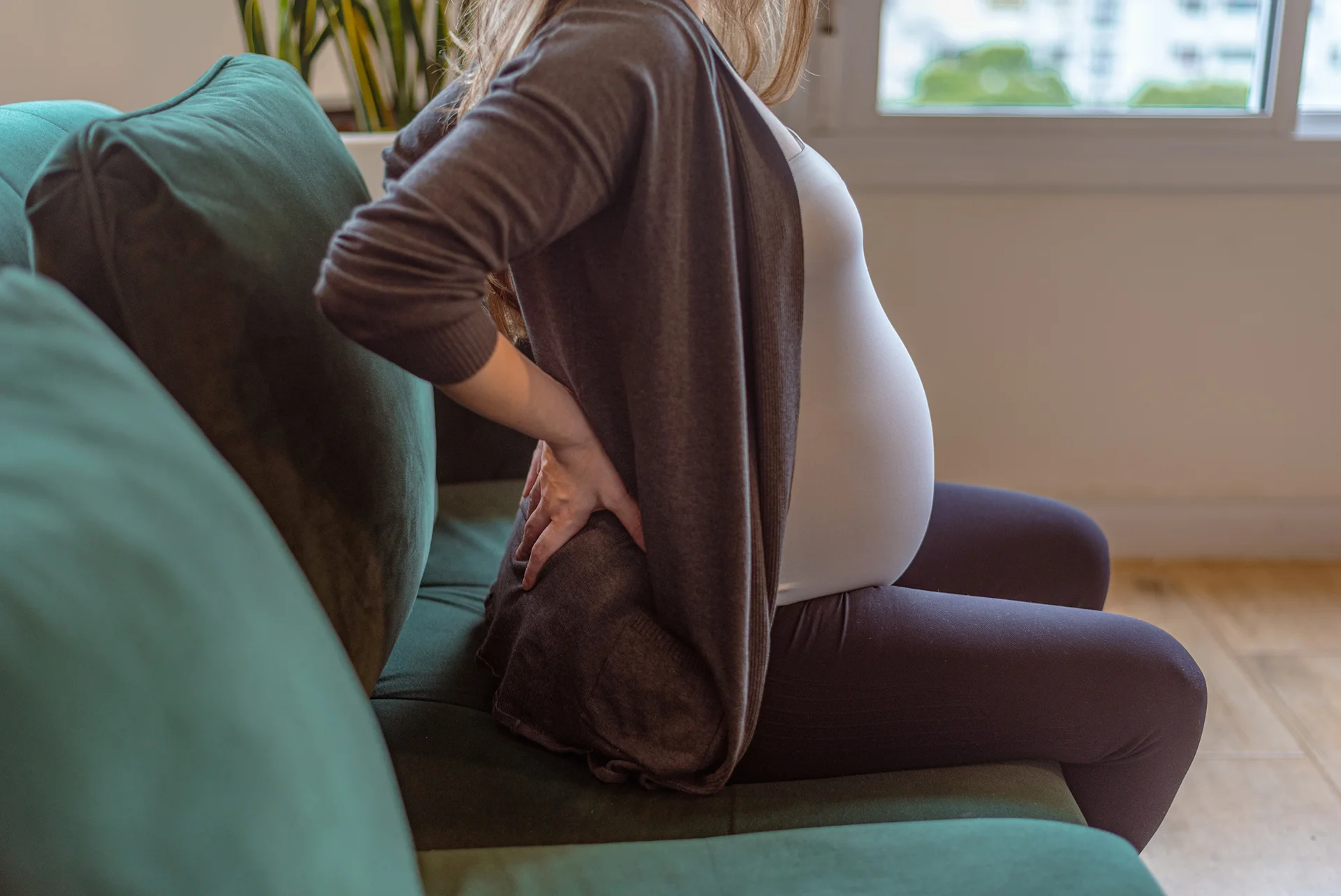Think You’re Too Early for Aches? Reading This Will Make You Think Again
When you first see those two pink lines, you expect some nausea and tiredness—but lower back pain at just 4 weeks? Could something be wrong? Relax, mild back discomfort isn’t uncommon in early pregnancy, though the timing may surprise you.
What triggers the ache before your belly even grows? And when should you call your doctor about it? Get the knowledge you need to respond appropriately, directly from Kaly specialists.
Why Does My Lower Back Hurt in Early Pregnancy at 4 Weeks?

Hormonal changes like increased relaxin paired with blood volume expansion, ovarian cysts, posture changes, stress, and constipation cause lower back pain to start as early as 4 weeks of pregnancy.
- Hormone surges – Skyrocketing levels of relaxin and progesterone loosen the ligaments and joints to make room for the baby. Unfortunately, this also destabilizes the joints in the pelvis and spine prematurely.
- Blood volume increase – To support your growing baby, your blood volume rapidly expands in the first few weeks. This places extra strain on the lower back before the belly has even started to grow.
- Ovarian cysts – Some women develop benign cysts on the ovaries in early pregnancy which can rupture or twist, causing severe abdominal and back pain.
- Stress and fatigue – Anxiety about a new pregnancy paired with early nausea and fatigue often prevents moms-to-be from maintaining their usual fitness routine, leading to back strain.
- Bowel changes – Hormonal shifts and pregnancy-related constipation can trigger gas and bloating that refers pain to the lower back and pelvic region.
- Postural adjustments – As your body accommodates its new tenant, you subconsciously adjust your stance, which subtly realigns the spine and pelvis.
In most cases, the soreness stems from a combination of these common factors. But is an aching back something to worry about?
Take control of early pregnancy back pain. Instantly book top specialists on Kaly.
Is Back Pain Normal in Early Pregnancy?
Here’s some reassuring news – mild to moderate back pain is very normal during the first trimester and not necessarily a cause for concern. As we mentioned earlier, up to 3 in 4 pregnant women deal with an aching back in early pregnancy.
According to Kaly specialists’ expert opinion, you can consider back pain a standard part of the pregnancy package, along with nausea, fatigue, and frequent urination.
This normal discomfort is simply your body’s response to the rise in hormones like relaxin and the physical adjustments happening internally.
While annoying, run-of-the-mill back soreness is no cause for alarm and is unlikely to signal problems with your pregnancy. However, severe or worsening pain deserves attention, so keep reading.
How to Relieve Early Pregnancy Back Pain
Back discomfort may be common, but that doesn’t mean you have to suffer through the ache. Use this advice from our specialists to find some relief:
- Apply Heat or Ice – Heating pads or cold packs can ease muscle tension and discomfort. Try alternating heat and cold to determine which brings more relief.
- Massage the Area – Ask your partner for a gentle back and shoulder rub to help you relax. A prenatal massage therapist can also address problem spots safely.
- Try Gentle Stretches – Simple yoga poses like the cat-cow tilt gently lengthen tight muscles. Check with your doctor before starting prenatal yoga.
- Support Your Bump – Wearing a maternity support belt takes the pressure off your back and core.
- Maintain Good Posture – Sit up straight, avoid slouching, and get up periodically if sitting for long periods.
- Sleep on Your Side – Place a pillow between your knees and under your belly while sleeping to minimize stress on the spine.
When to See Your Doctor About Early Pregnancy Back Pain

In most cases, back discomfort during the first trimester will resolve on its own or respond well to self-care. However, severe, worsening, or unusual nerve-related pain warrants a call to your healthcare provider right away.
Based on our experience, we recommend seeking medical advice about back pain if:
- The pain is severe, and debilitating and doesn’t improve with rest or OTC medication after a few days
- You experience numbness/tingling or your pain radiates down your leg
- Your back pain results from injury or trauma like a fall or car accident
- Over-the-counter treatments don’t provide any relief
- You have additional symptoms like fever or abdominal pain
These scenarios point to potentially serious issues requiring evaluation beyond normal aches. Examples include kidney stones, ovarian cysts, and fibroids. Always check with your doctor if your back pain feels unusual or excessively painful.
Preventing Early Pregnancy Back Pain
While not always possible to avoid entirely, you can take certain steps to help minimize back discomfort in the first trimester:
- Exercise regularly before and during pregnancy to strengthen core muscles. Check with your doctor first about safe prenatal fitness.
- Maintain good posture and use ergonomic furniture and support cushions.
- Avoid lifting heavy objects and seek help with strenuous household chores.
- Wear flat, supportive shoes with anti-slip soles.
- Listen to your body and slow down when needed to avoid overexertion.
Pregnancy back pain stinks, but a little TLC goes a long way. Be patient with your changing body, stick to your pain management plan, and remember – the second trimester brings welcome relief for many moms-to-be!
When Back Pain Means Something More Serious
We’ve covered the common, typically benign causes of early pregnancy back pain. But in rare cases, severe lower back pain can signal more worrisome pregnancy complications in the first trimester.
Contact your doctor immediately if your back pain is coupled with:
- Vaginal bleeding or cramping – Potential signs of miscarriage or ectopic pregnancy
- Severe abdominal pain – Can indicate an ovarian cyst, kidney stone or infection
- Fever, chills, nausea/vomiting – Possible kidney infection or UTI
- Swelling or pain in one leg – Risk for blood clot needing urgent care
- Trouble urinating – Kidney stone or UTI may block urine flow
- Vision changes, headache, dizziness – Signs of preeclampsia
- Trauma such as a car accident or fall – Chance of fracture or nerve damage
When to Choose Surgery for Pregnancy Back Pain
In the rare event conservative treatments fail to ease intolerable, disabling back pain, surgery may become an option. But the risks to mom and baby make surgery an absolute last resort during pregnancy.
According to Kaly specialists’ expert opinion, surgery may be cautiously considered for:
- Herniated discs causing severe nerve compression
- Spinal fractures or instability from trauma
- Certain tumors compressing the spinal cord
- Abscesses or infections unresponsive to antibiotics
Even then, surgery typically gets postponed until after childbirth when possible. Strict protocols minimize surgical risks like anesthesia complications, preterm birth, and fetal injury.
If facing this difficult situation, have an in-depth discussion with both your OB and spine surgeon about the pros and cons. Your health and safety remain the top priorities when making such a delicate decision.
When Back Pain Lingers Postpartum
After the baby arrives, you look forward to regaining your pre-baby body. But for many new moms, back pain persists long after giving birth. Why the lingering ache?
- Post Pregnancy Relaxin – Though levels gradually fall after your delivery, the relaxing effects of relaxin can remain for up to 5 months. This postpones your ligaments and joints tightening normally.
- Weak Core Muscles – Pregnancy and childbirth strain your abdominal and back muscles. rebuilding strength and stamina takes time. Proper core conditioning prevents pain.
- Posture and Body Changes – Caring for an infant and breastfeeding promotes poor posture. Your shifting weight often lingers until you retrain your body.
- Added Stress – Chasing a newborn, late nights, and anxiety means you often ignore self-care. Making your health a priority helps recovery.
If back pain continues beyond 6 weeks postpartum or worsens, seek medical guidance. Extended discomfort could signal rare issues like spinal injuries from labor or postpartum preeclampsia. But most often, it simply means you need more time for rest and restoration.
How to Speed Up Recovery from Postpartum Back Pain

According to our experience, new moms can take certain steps to hasten healing after delivery:
- Follow postnatal exercise guidelines to rebuild core and back strength
- Focus on good posture during nursing, baby carrying, and other tasks
- Take frequent rest breaks and accept help from loved ones
- Wear maternity supports while your abdomen and ligaments firm up
- Prioritize a healthy diet and stay hydrated to help the healing process
- Treat yourself to massages, physical therapy, or other treatments
Are you already hurting just weeks into your pregnancy? Let Kaly quickly connect you to OBs for answers.
FAQs
What could cause lower left back pain in early pregnancy at 4 weeks?
Lower left back pain at 4 weeks pregnancy may be from normal ligament/muscle changes, but can also indicate concerning issues like miscarriage, so contact your doctor about any severe or persistent back pain.
What could cause lower back pain on the right side in early pregnancy at 4 weeks?
Right-sided lower back pain in early 4-week pregnancy could stem from typical body changes but may also reflect problems requiring medical care like ectopic pregnancy, so see your doctor if the pain is severe or accompanied by other symptoms.
Could lower back pain in early pregnancy at 4 weeks be a sign of miscarriage?
While some back pain is common in early pregnancy, severe or worsening lower back pain at 4 weeks can indicate miscarriage, especially if accompanied by bleeding or cramps, warranting prompt medical attention.
Should I be concerned about lower back pain and bleeding in early pregnancy at 4 weeks?
Yes, lower back pain with any bleeding or spotting at 4 weeks pregnancy requires immediate medical assessment to check for potential complications like miscarriage or ectopic pregnancy.
Should I be concerned about lower back pain and cramps in early pregnancy at 4 weeks?
Back pain and cramps at 4 weeks pregnancy may reflect normal changes but can also be miscarriage symptoms, so contact your doctor promptly for evaluation if the pain seems abnormal or gets worse.
